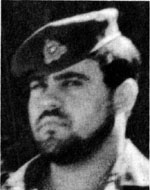Son of Israel and Nechama. He was born on 7 November 1946 in Pardes Chana, where his father was one of the best students of the “Yeshiva” of Gur Asher in Jerusalem, who completed the slaughter and moved to Pardes Hanna at the request of Rabbi Kook to “be together with the pioneers of Habonim The new colony. “His mother, who was born in Tiberias, encouraged her husband, the Jerusalem Hasid, to start their lives anew.This moshav, which was new and unfamiliar to them, was surrounded by hostile Arab tribes, The father had to work in various professions: he brought the mail and the newspapers from Hadera daily (a distance of ten kilometers he made on foot); His mother ran the local dairy because she brought the cheesecake industry from her father’s home, but they always had the time to educate their young children properly. It was a sign of Tuvia’s moods, thoughts, and hospitality, and he was willing to work and knew how to carry out the work he had been assigned to him. others. As a child, he attended the religious elementary school in the village. The love of man as a person, the worship of God in faith and in good faith, striving with all his might for a secure future – such traits and qualities were evident in his actions in daily life – even during childhood and even more during the period of maturity. Tuvia did not finish the elementary school in Pardes Hannah, because the local rabbi recommended directing several students – including him – to the Mechina near the Ponevezh yeshiva in Bnei Brak. In fact, his period of study began at Yeshivas and they had such an impact on the course of his thoughts. When he came to “yeshiva” he stood out in his strong desire to be good, with great diligence, in his connections and his fondness for the group, his honesty and his honesty with himself and with others. He learned his Talmud not with extreme ease, but with extraordinary diligence – and more than once his teachers and his friends were aroused by this diligence. He studied with exaltation. But Tuvia knew when he was a boy that he had one goal in his life, and he was acquiring a profession, but again without depriving him of Torah studies. Therefore, it seemed natural to him to study at Yeshivah “Torah and Crafts” in Kfar Avraham. In this “yeshiva” he again stood out for his stubborn diligence and his great strength to work – and to work hard. While he was studying at Yeshiva, he worked in the courtyards of the nearby settlers of Kfar Avraham and in his salary he released his parents from his support, and after he completed his studies there and received a suitable matriculation certificate, he continued his efforts to acquire more knowledge of the Talmud. “The high one named” Merkaz Harav “in Jerusalem, and planned to study there for only one year, and this was accompanied by the wonderful spiritual forces that were hidden in it – and for a short time his name came to fame and was borne by everyone. In “Yeshiva” and happiness he once expressed his face in one of his conversations, saying: “How good and Yaffa are life in the yeshiva – a spiritual life from morning to evening, learning Vera and observance, the following as a consequence of thought and knowledge. It’s really a paradise in this world. But soon I must stop my studies and fill my army service. But during the period of his service he saw Tuvia, the “yeshiva” man, as sincerity and naivety, impeccable loyalty and the fulfillment of another commandment on purpose and thought – that is, the observance of the love of the Land of Israel and the protection of the Land of Israel When he was released from his regular service, he intended to returnTo study in Yeshiva, until “I feel myself ripe for a wedding and a livelihood,” he said. It was clear to him that in Pardes Hanna he would build his house. But after his father died, he saw himself as his replacement at home. The family saw and felt that the boy had grown up, became a serious man and progressed toward his destiny – to build his own home near his parents’ home. With this in mind, he faithfully nurtured his court and renovated his home, and he would suggest that he sees the Temple in this house, as he used to say, “It was built from the tears of father and mother and their labor.” In the course of his regular service in the IDF, after he was drafted into the elite unit in August 1966, he proved his education to Torah, Judaism and nationality, and he traveled extensively throughout the country seeking to compensate for his years in the Ulpana and Yeshivot. He spent all his life in the highlands of Jerusalem and the depth of Sinai, and all that he saw was immortalized in the photographs of landscapes that took his Lev – and his ability during the tour – while he was taking advantage of the Passover holidays for a tour of Jerusalem and Meron. With great Torah scholars, with senior army officers and sometimes by a group of porters in the colony or wagon drivers and found a language And he continued to serve him with devotion and loyalty until the 13th of Nissan 5739 (13.4.1969), when Tuvia fell in the line of duty. And his family published a booklet in his memory called “Tuvia.” His friends in the military unit and his many colleagues in the moshava and in yeshivas described Tuvia’s virtues and virtues in another booklet called Yizkor.
